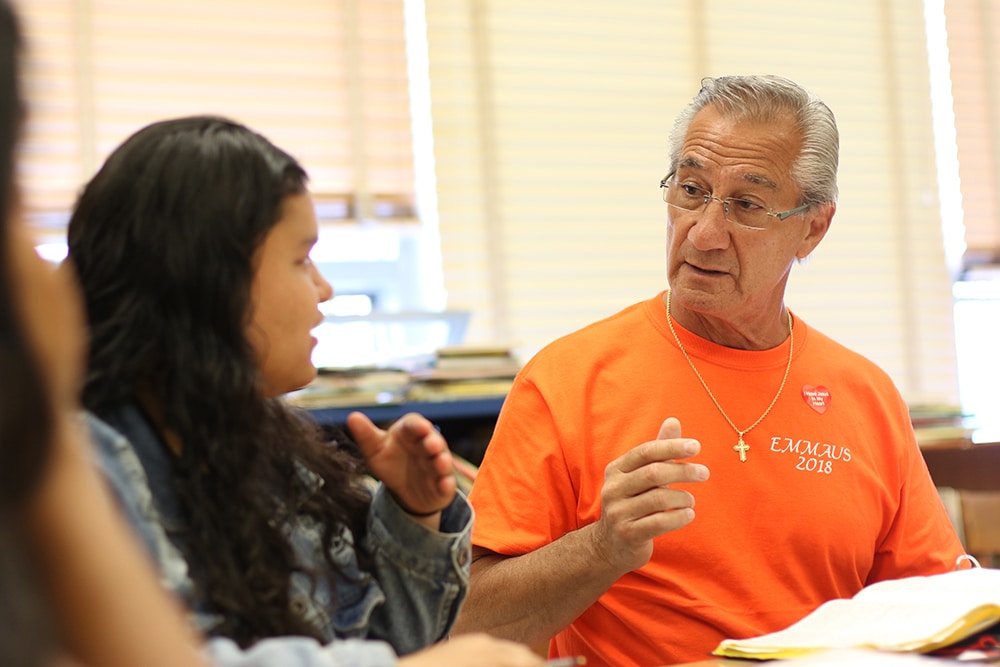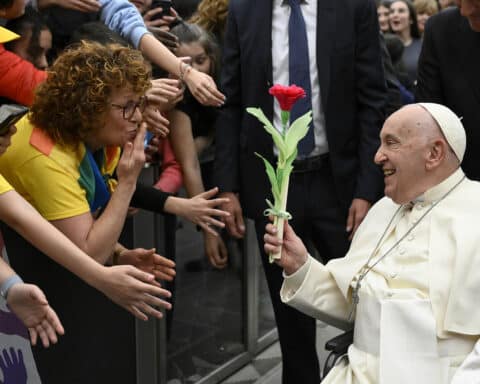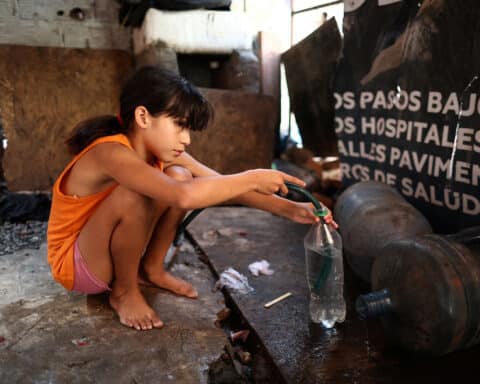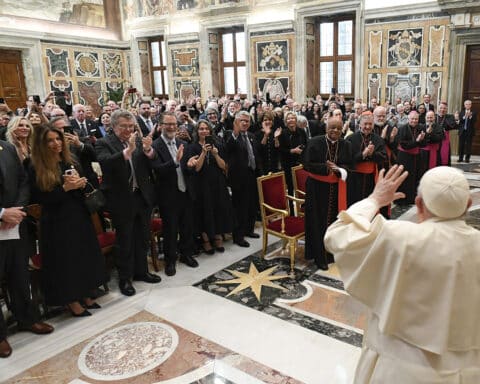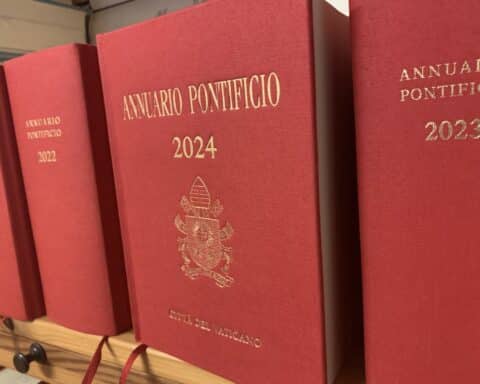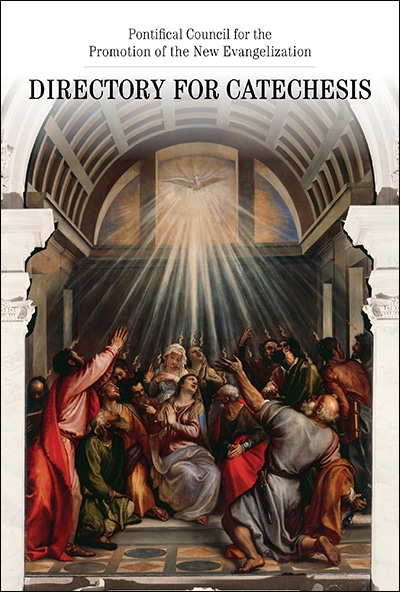
The Pontifical Council for Promoting New Evangelization today announced the release of the new Directory for Catechesis for the universal Church. A set of directives to all those who teach the Catholic faith, this is the third such directory in the history of the modern Church. Responding to today’s release of the document, Margaret Matijasevic, Executive Director of the National Conference for Catechetical Leadership said: “The launching of the new Directory for Catechesis is the next significant moment in the Church’s history. This document offers everyone involved in catechesis the opportunity to live more deeply our mission to echo the Faith.”
History and development of the directory
The call of the Second Vatican Council to renew catechesis led to the publication of the General Catechetical Directory (GCD) in 1971, written “to provide the basic principles of pastoral theology … by which pastoral action in the ministry of the word can be more fittingly directed and governed,” including “the correct way of understanding the nature and purposes of catechesis and also the truths which are to be taught by it.” The promulgation of the Catechism of the Catholic Church in 1993 was a significant enough development to necessitate a new worldwide directory, called the General Directory for Catechesis (GDC). The GDC was published in 1997 and capitalized on the themes of Pope St. John Paul II’s apostolic exhortation Catechesi Tradendae, which affirmed the importance of catechesis of adults, discussed evangelization and inculturation of the Faith and listed six essential tasks of catechesis.
The second decade of the 21st century has brought increasing concern about the de-Christianization of Western societies and increasing sociopolitical instability in our world. Recent popes have called for a New Evangelization that focuses on a conversion of hearts, leading to a more active participation in the Church and living the Faith in everyday life. To this end, Pope Francis has emphasized the importance of missionary discipleship — the call of all the baptized to follow Jesus and to share him with others in practical ways that change both individual hearts and the culture as a whole.
The new Directory for Catechesis is the result of several years of discussions and consultation regarding how best to meet contemporary catechetical needs and challenges. In 2015, the Pontifical Council held a plenary meeting on the relationship between catechesis and evangelization with representatives from around the world. During that meeting, it became evident that a new directory was necessary in light of new developments in both the Church and in contemporary society. With the input of a worldwide team of experts, a first draft of a new directory was written and discussed at the 2017 plenary meeting. The revised text was sent to approximately 200 theologians and catechists, and further elaborated and revised.
Structure, organization and key themes
The new directory, approved by Pope Francis on March 23 and released by the Vatican today, consists of three main parts, each containing four chapters. Part 1 focuses on the relationship between catechesis and the Church’s mission of evangelization. It includes chapters on divine revelation and its transmission in the Church, the identity of catechesis (including its goals, tasks and sources), the identity and vocation of catechists, and formation of those who hand on the Faith. The second part of the document, focused on the process of catechesis, contains chapters on the pedagogy of the Faith (based on the divine pedagogy), the Catechism of the Catholic Church and its use in catechesis, catechetical methodology, and the recipients of catechesis across the lifespan and in various circumstances. The third and final part of the new directory, titled “Catechesis in Particular Churches,” centers around various expressions of the Christian community where catechesis takes place, as well as the dialogue between catechesis and daily life. It includes chapters on the role of the Christian community in catechesis (including in parishes, association and movements, and Catholic Schools), the way in which catechesis confronts current cultural contexts, trends and ideas, the role of catechesis in inculturation of the Faith, and the roles of the structures that oversee catechesis, including the Holy See, conferences of bishops and dioceses.
A key theme throughout the new directory is the importance of both the initial and ongoing proclamation of the kerygma — the core, saving message of Jesus Christ — in the process of catechesis. The new directory echoes and expands upon a point made in the 1997 General Directory for Catechesis — that catechesis is not simply a stage in the process of evangelization, but rather evangelization is an integral part of catechesis throughout the lifespan. We are all in need of a continuous reminder of the core of the Gospel message, articulated by Pope Francis in his 2019 apostolic exhortation Christus Vivit: “God loves you; Christ is your savior; he is alive” (No. 130).
Another key theme is the interaction of catechesis with arts and sciences. In Paragraph 172, the document makes reference to the transcendentals — the three properties of being that point humanity to the divine — namely, truth, beauty and goodness. In the section on methodology in catechesis, the directory speaks eloquently of the role of music and visual arts in teaching the Faith throughout history and their ability to inspire belief in modern times (Paragraphs 209-212). The document also discusses the valuable potential contributions to catechesis that can be made by the human sciences, such as educational theory and developmental psychology as well as the way in which catechesis can inform these sciences and their view of the human person. Also examined is the role of catechesis in discussions of bioethics.
In keeping with Pope Francis’ emphasis on missionary discipleship, the Directory for Catechesis urges those who teach the Faith to form followers of Jesus who can not only articulate their faith, but live it in practical ways in various cultural arenas and in the face of current global challenges. Included here are paragraphs on how catechesis should spur social and political action related to the defense of life and human dignity and protection of the environment. An extensive section on catechesis and digital culture (Paragraphs 359-361) discusses how modern technology has affected our perceptions, understanding and relationships. It describes digital spaces as mission fields and potential tools for catechesis, but also cautions against the risks of social isolation and polarization in the digital landscape.
Consistent with its presentation of catechesis as an ongoing process that continues throughout the lifespan, the Directory for Catechesis presents additional directives on catechesis of adults (Paragraphs 257-268), including lists and descriptions of specific tasks of catechesis with adults, criteria for adult catechesis and forms of adult catechesis.
In a press release issued this morning by the U.S. Conference of Catholic Bishops, Bishop Robert Barron, auxiliary bishop of Los Angeles and chairman of the U.S. Conference of Catholic Bishops’ Committee on Evangelization and Catechesis, welcomed the new directory, writing: “We are excited to have a fresh and focused tool to enhance our evangelization efforts in catechesis. The new directory highlights the centrality of the Church’s mission of bringing the world to an authentic encounter with Christ, an encounter that inspires and propels people as witnesses for the Faith. In an age marked by tremendous social and cultural challenges, as well as ever-expanding digital tools which have often left the field of catechesis behind, the timing of this updated resource is providential.”
Today’s release marks the publication of the Directory for Catechesis in Italian. Translations in several other languages will follow, including an English translation scheduled for release in the United Kingdom on July 2nd and in the United States at the end of July.
Dr. Joseph White is director of catechetical resources for OSV.

